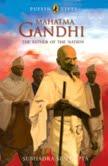
This biography of Mahatma Gandhi provides an insightful chronicle of his life and times.
The book begins with a summary of who he was, what he means to India and to the world, his historic achievements, his worldwide name, fame and his heritage that continues to inspire reform. It also includes his qualities as a person characterizing some of these in language that today’s children can relate to – He disliked putting on his false teeth and ate the most boring food you can imagine. Having whetted our appetite for knowing more about him, about what forces shaped his life, and about what was his personal life like, the author steps us through his life story.
While speaking about Gandhi’s life as a shy schoolboy who faces the usual struggles of growing up, the author highlights Gandhi’s ability and character to experiment and to learn and know himself and his world. Continuing into his life as a student of law in England and then through his experiences in South Africa the book does not merely relate events. Instead, the relationship between those events and how they may have influenced his thinking and his insights are frequently explored. Did being physically thrown off the train in Africa and spending a night in a lonely railway station, humiliated, cold and tired lead him to the realization that injustice must be fought, but not with arms and weapons but with non-violent means? This theme of relating events to insights continues through the description of his days after returning to India, shaping and executing the nationwide movements that ultimately led to India’s independence.
At a personal level description of some of his interactions with others, his wife Kasturba and his children in particular provide a glimpse into his struggles as a husband, provider and father. The authors voice addressing young audiences does falter as the book progresses and takes on a more matter-of-fact tone, but this is somewhat alleviated by the “history bug” briefs that will help hold the attention of the younger readers.
While the story of the life and times of Mahatma Gandhi has been told and retold by numerous authors and in many media, in “Mahatma Gandhi – The Father of the Nation”, Subhadra Sen Gupta presents that story with style and content that would appeal to the young audiences of today.
The biography is historically accurate and complete like many others and perhaps some of them, including Gandhi’s autobiography are more detailed - but what sets this book apart is the serious attempt to present events and ideas in today’s context and in a way that children (probably 10 years old and above) would be able to relate to. The content will also appeal to adults seeking an insightful brief on M. K Gandhi. – Father of the Nation.